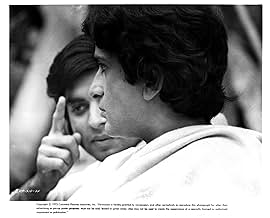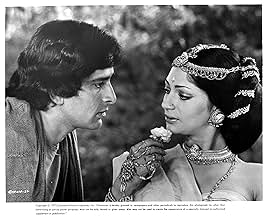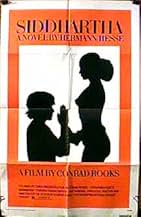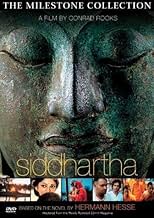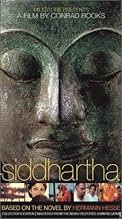IMDb रेटिंग
6.6/10
1.3 हज़ार
आपकी रेटिंग
अपनी भाषा में प्लॉट जोड़ेंThe story of a young Indian who embarks upon a journey to find the meaning of existence. Based on the novel by Hermann Hesse.The story of a young Indian who embarks upon a journey to find the meaning of existence. Based on the novel by Hermann Hesse.The story of a young Indian who embarks upon a journey to find the meaning of existence. Based on the novel by Hermann Hesse.
फ़ीचर्ड समीक्षाएं
If you loved the book by Hermann Hesse, you will most likely love this film. At times, it seems rather disjointed - almost as though I had blinked and missed a scene. I really consider this film to be a great companion to a great book. I am curious to know what people who had not read the book would think of this film.
10pinoj18
I saw the movie Siddhartha some time ago because when I first saw the title, I recognized it as a philosophical work from my college days when I study Hesse's work from my philosophy class.
It is a great film: I enjoyed it as much as I enjoyed the book by Hermann Hesse. As a philosophy major, the philosophical underlinings in the movie are most appropriate. It is by all accounts, a true Hesse's commentary on the meaning of life and man's condition on earth.
I especially liked the music although the lyrics were foreign to me. I wish I could get a translation of the songs that made the film even more enjoyable.
A great philosophical work of art.
It is a great film: I enjoyed it as much as I enjoyed the book by Hermann Hesse. As a philosophy major, the philosophical underlinings in the movie are most appropriate. It is by all accounts, a true Hesse's commentary on the meaning of life and man's condition on earth.
I especially liked the music although the lyrics were foreign to me. I wish I could get a translation of the songs that made the film even more enjoyable.
A great philosophical work of art.
No movie that is even marginally true to the story that Nobel Prize-winning German author Hermann Hesse told in his novel Siddhartha (1951) is without merit; and this modest film is no exception. The problem is, that while Conrad Brooks, who wrote, directed and produced the film, is true to the storyline of the novel and even in some respects true to the spirit of the novel, he fails to bring the power and the resplendence of Hesse's philosophic and spiritual masterpiece to the screen.
What made the novel one of the best ever written is the character of Siddhartha himself. Patterned after the Buddha both in temperament and in experience, Hesse's Siddhartha, "the Accomplished One," grew up amid extravagant wealth and privilege only to dump it all in an effort to find himself. Brooks fails almost immediately when he leaves out the scene from the book in which the young Siddhartha, not wanting to directly disobey his father (and to demonstrate his resolve) stands up all night waiting patiently for his father's permission to leave their splendid estates. This is one of the great "coming of age" scenes ever written and an early insight into Siddhartha's strength of character, but Brooks gives it barely a notice! Also skirted over too quickly are Siddhartha's years with the samanas in the forest where he practiced meditation and austerities. This part of Siddhartha's life was essential in making him the man he was and in showing us his character. He spent six years with the shamans and gurus of the forest (along with his companion Govinda) and in the end learned everything they knew and more, and yet had not found the answer he sought. (This parallels the experience of the "emaciated" Buddha.) Brooks does do the meeting with the Buddha well, having us hear his voice but not see him, and then follows that up with Siddhartha's reasons for not following the Buddha, even though he finds no fault with the Enlightened One's teachings. Note that without his actually meeting the Buddha, the life of Siddhartha (which is one of the traditional names of the Buddha) would so closely parallel that of the Buddha that some people might think that Hesse had written a profane life of the Buddha, which might not set well with some Buddhists! (Of course we all have the Buddha nature.) Siddhartha's life with the courtesan Kamala and the merchant Kamaswami and his spiral into debauchery and sloth is well depicted, although again the ultimate disillusionment that Siddhartha experienced is not as well presented as in the novel. Which brings me to Shashi Kapoor who plays Siddhartha. Although he would go on to be the veteran of well over a hundred films, and although he is appropriately enough Indian as well as tall, dark and handsome and a good actor, he fails to evoke the passion that Siddhartha must have. Siddhartha felt everything in a profound manner, even boredom was profoundly experienced by the Brahmin's prodigal son. Kapoor, especially near the end of the film when he plays an old man, occasionally made me feel that he could be "the Accomplished One," but more often he made me feel that he was holding something back.
Finally, the poetic scene near the end of the novel when, after living with and being guided by Vasudeva, the ferryman, Siddhartha becomes one with the river and falls spiritually into its wisdom, is only a bland shadow of what appears in the novel! Part of the reason for the failure probably has to do with a limited budget. The film is 83 minutes long, but could easily be twice that long. Part has to do with the selection of scenes and the emphasis on those scenes, and finally part of the reason has to do with the relative inexperience of Brooks who was only directing his second major film (and apparently his last). Certainly the on-location in India cinematography by Sven Nykvist who worked on so many films with Ingmar Berman is not to be faulted. Although not spectacular, Nykvist's camera conveys both the exotic beauty and the poverty of a landscape that could have been India 26 centuries ago.
(Note: Over 500 of my movie reviews are now available in my book "Cut to the Chaise Lounge or I Can't Believe I Swallowed the Remote!" Get it at Amazon!)
What made the novel one of the best ever written is the character of Siddhartha himself. Patterned after the Buddha both in temperament and in experience, Hesse's Siddhartha, "the Accomplished One," grew up amid extravagant wealth and privilege only to dump it all in an effort to find himself. Brooks fails almost immediately when he leaves out the scene from the book in which the young Siddhartha, not wanting to directly disobey his father (and to demonstrate his resolve) stands up all night waiting patiently for his father's permission to leave their splendid estates. This is one of the great "coming of age" scenes ever written and an early insight into Siddhartha's strength of character, but Brooks gives it barely a notice! Also skirted over too quickly are Siddhartha's years with the samanas in the forest where he practiced meditation and austerities. This part of Siddhartha's life was essential in making him the man he was and in showing us his character. He spent six years with the shamans and gurus of the forest (along with his companion Govinda) and in the end learned everything they knew and more, and yet had not found the answer he sought. (This parallels the experience of the "emaciated" Buddha.) Brooks does do the meeting with the Buddha well, having us hear his voice but not see him, and then follows that up with Siddhartha's reasons for not following the Buddha, even though he finds no fault with the Enlightened One's teachings. Note that without his actually meeting the Buddha, the life of Siddhartha (which is one of the traditional names of the Buddha) would so closely parallel that of the Buddha that some people might think that Hesse had written a profane life of the Buddha, which might not set well with some Buddhists! (Of course we all have the Buddha nature.) Siddhartha's life with the courtesan Kamala and the merchant Kamaswami and his spiral into debauchery and sloth is well depicted, although again the ultimate disillusionment that Siddhartha experienced is not as well presented as in the novel. Which brings me to Shashi Kapoor who plays Siddhartha. Although he would go on to be the veteran of well over a hundred films, and although he is appropriately enough Indian as well as tall, dark and handsome and a good actor, he fails to evoke the passion that Siddhartha must have. Siddhartha felt everything in a profound manner, even boredom was profoundly experienced by the Brahmin's prodigal son. Kapoor, especially near the end of the film when he plays an old man, occasionally made me feel that he could be "the Accomplished One," but more often he made me feel that he was holding something back.
Finally, the poetic scene near the end of the novel when, after living with and being guided by Vasudeva, the ferryman, Siddhartha becomes one with the river and falls spiritually into its wisdom, is only a bland shadow of what appears in the novel! Part of the reason for the failure probably has to do with a limited budget. The film is 83 minutes long, but could easily be twice that long. Part has to do with the selection of scenes and the emphasis on those scenes, and finally part of the reason has to do with the relative inexperience of Brooks who was only directing his second major film (and apparently his last). Certainly the on-location in India cinematography by Sven Nykvist who worked on so many films with Ingmar Berman is not to be faulted. Although not spectacular, Nykvist's camera conveys both the exotic beauty and the poverty of a landscape that could have been India 26 centuries ago.
(Note: Over 500 of my movie reviews are now available in my book "Cut to the Chaise Lounge or I Can't Believe I Swallowed the Remote!" Get it at Amazon!)
10movinut
I saw the movie twice, the first time in Sweden in 1974; I had read Herman Hesse's book before that, and the story had strongly impressed me. The movie was even better then the book! the photography was very poetic, the music (indian flutes, tablas) was very high in the aesthetics band, and the story conformed more or less with the book, but without taking away any of it's impact. there were 12 people in the theatre, and at the end as the credits were scrolling for what seemed at least 20 minutes, no-one moved from their seats as transfixed by what they had just seen. I am sure that all 12 of those people recall to this day the effect that this film created on them. I am not a Buddhist or even very religious, but i personally recommend it as part of a person's education in life....
This film is stunning in its beauty. The music is transcendent. For the longest time I tried to get the soundtrack. To save you the trouble, be aware that they never made one! There is one scene in which a woman blows on a shell that was so powerful I still remember 30 years later. Mesmerizing. If you have not seen it yet, rent it today.
क्या आपको पता है
- ट्रिवियाSimi Garewal took the boldest step in her career by going topless for a scene in this film. It was the first topless scene in the history of Bollywood and created a massive uproar. When the scene was featured on the cover of two English magazines, it created more controversy and ended up in court. The film eventually got banned in India. When asked about it years later, Garewal, who said she was never shy, revealed that she would have stripped totally naked if they had let her. In fact, she had been totally nude in front of the filming crew for Mera Naam Joker the same year, but they only showed her from the back onscreen. She said she loved the freedom of losing her inhibitions and her clothes.
- भाव
Siddhartha: I have come to say, that you are all the things that will outlive me, that you, Kamala, will be all the beauty that will be in the shadow we leave. You will be my first love, my only love.
- कनेक्शनReferenced in Thirtysomething: Melissa and Men (1991)
- साउंडट्रैकMother's Song
by Shanti Hiranand
टॉप पसंद
रेटिंग देने के लिए साइन-इन करें और वैयक्तिकृत सुझावों के लिए वॉचलिस्ट करें
- How long is Siddhartha?Alexa द्वारा संचालित
विवरण
- चलने की अवधि1 घंटा 29 मिनट
- ध्वनि मिश्रण
- पक्ष अनुपात
- 2.35 : 1
इस पेज में योगदान दें
किसी बदलाव का सुझाव दें या अनुपलब्ध कॉन्टेंट जोड़ें




